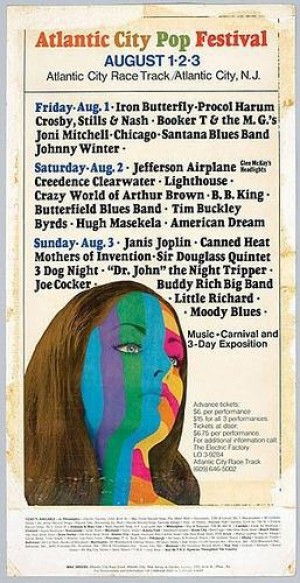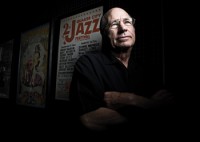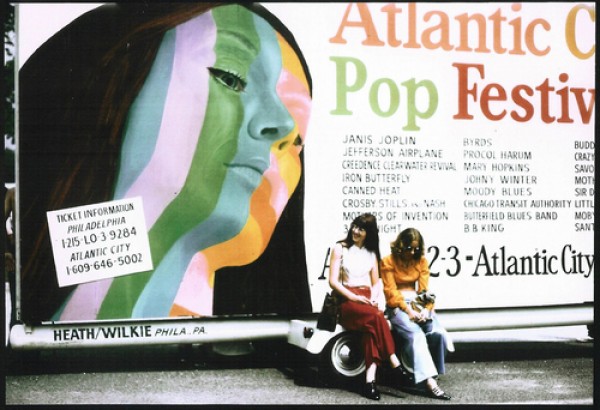BY DALLYN PAVEY It was September 30, 1967 when the Spectrum celebrated its grand opening with the Quaker City Jazz Festival. Herb Spivak [pictured, below left] booked the two day event that opened with Dizzy Gillespie playing the Star Spangled banner. Spivak, the founding partner of the original Electric Factory, originally wanted to be a geologist but soon discovered there were more financial rewards in rock and roll than in rocks so this nice Jewish boy from Wynnefield became the biggest buyer of talent in Philadelphia in the mid 1960s. Spivak remained an owner of Electric Factory Concerts until 2000, when it was bought by SFX Entertainment (later known as Clear Channel and presently Live Nation). Spivak, along with partners Larry Magid and brothers Jerry and Allen Spivak are the pioneers of today’s thriving Philadelphia live music scene.
Herb Spivak became a taproom operator at the age of 22 after the death of his father, Harry “Speedie” Spivak. Along with brothers Jerry and Allen, he owned and operated several bars called Speedie’s throughout the city. In 1964, Spivak  bought The Showboat at 1409 Lombard Street in the basement of the Douglas Hotel. After eight months of operation, Spivak doubled the seating capacity to 200 and renamed it the Showboat Jazz Theatr (the missing E was solely to get attention). Jazz greats Miles Davis, Thelonious Monk, Dizzy Gillespie, Lou Rawls and Dinah Washington regularly played there. One night, after playing the Showboat, legendary jazz pianist Ramsey Lewis and Spivak were on their way to the Harvey House for a late bite. As they walked by the Academy of Music, Lewis stopped and said “I’d like to play there some day.” The next morning, Spivak met with the manager of the Academy and booked Ramsey Lewis, who played two sold out concerts on Mother’s Day in 1965. “ And that was how it all began,” says Spivak. “It was that easy in those days!”
bought The Showboat at 1409 Lombard Street in the basement of the Douglas Hotel. After eight months of operation, Spivak doubled the seating capacity to 200 and renamed it the Showboat Jazz Theatr (the missing E was solely to get attention). Jazz greats Miles Davis, Thelonious Monk, Dizzy Gillespie, Lou Rawls and Dinah Washington regularly played there. One night, after playing the Showboat, legendary jazz pianist Ramsey Lewis and Spivak were on their way to the Harvey House for a late bite. As they walked by the Academy of Music, Lewis stopped and said “I’d like to play there some day.” The next morning, Spivak met with the manager of the Academy and booked Ramsey Lewis, who played two sold out concerts on Mother’s Day in 1965. “ And that was how it all began,” says Spivak. “It was that easy in those days!”
By the end of the 60s, jazz was out and rock was in. Spivak and his business partner, Shelly Kaplan, were itching to do something new and exciting. They heard about the Electric Circus, a nightclub in New York’s East Village where you could play games, watch circus performers and dance under psychedelic lights. The Philadelphia partners wanted to create that kind of experience in Philly, where people could just hang out. They opened the Electric Factory in February 1968 in a converted Goodyear Tire plant at 22nd and Arch. The logo design featured the father of electricity and Spivak’s personal hero, Benjamin Franklin. Spivak thought live music would encourage people to come every night and asked 25-year-old Larry Magid to come back from New York to book the shows and manage the club. Magid would later become a partner. The Velvet Underground, Jimi Hendrix, The Grateful Dead, The Who, and Cream were just a few of the rock superstars that graced the Electric Factory stage. Philadelphia’s legendary rock club was not quite three years old when it closed in 1970 because acts wanting more money, and legal expenses brought on by the near-constant harassment of then-Police Commissioner Frank Rizzo’s goon squad.
 The Atlantic City Pop Festival, which celebrates its 45th anniversary this weekend, took place on the first three days of August, 1969 — just two weeks before Woodstock. Spivak had been reading about the Miami Pop Festival and decided to do one here. On his way to the shore one weekend, he instinctively pulled into the Atlantic City Racetrack and asked for the owner, Bob Levy. On a hand shake deal, Spivak secured the racetrack and borrowed money to promote the legendary festival. Spivak and Magid booked the talent which included Janis Joplin, Iron Butterfly, Jefferson Airplane, Frank Zappa, The Chambers Brothers and Mamma Cass. They hired Electric Factory manager, Dave Kasanow to drive around the country in a Volkswagen Beetle and promote the show by handing out posters and doing interviews on rock radio stations. Somehow it all worked and more than 100,000 attended the first Atlantic City Pop Festival. “It was very grass roots,” recalls Spivak. “Not exactly like things are done today.”
The Atlantic City Pop Festival, which celebrates its 45th anniversary this weekend, took place on the first three days of August, 1969 — just two weeks before Woodstock. Spivak had been reading about the Miami Pop Festival and decided to do one here. On his way to the shore one weekend, he instinctively pulled into the Atlantic City Racetrack and asked for the owner, Bob Levy. On a hand shake deal, Spivak secured the racetrack and borrowed money to promote the legendary festival. Spivak and Magid booked the talent which included Janis Joplin, Iron Butterfly, Jefferson Airplane, Frank Zappa, The Chambers Brothers and Mamma Cass. They hired Electric Factory manager, Dave Kasanow to drive around the country in a Volkswagen Beetle and promote the show by handing out posters and doing interviews on rock radio stations. Somehow it all worked and more than 100,000 attended the first Atlantic City Pop Festival. “It was very grass roots,” recalls Spivak. “Not exactly like things are done today.”

